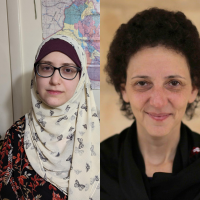
When it comes to occupation, Israeli human rights organisations are part of the problem
"Israeli bulldozers raze a 12-century Muslim cemetery in Jerusalem for settlement projects, including a theme park."
Just another day in Palestine, one may think. But different from the daily Israeli violations that dominate the media headlines - from arrests to checkpoints to incursions - is the encroachment upon Palestinian history, and thus represents the largest existential threat on Palestinians everywhere. The normalisation of historical erasure, in fact, is what most defines Israel's settler-colonialism.
Since its inception, in a series of small acts of fait accompli practices and legal impositions, the Israeli state has been erasing the physical and archival evidence of Palestine and its inhabitants.
Zionism views history as a subjective device that can be controlled and reconstructed by the formation of a proactive and over-imposing Israeli reality. Indispensable to this reality is the incremental displacement of native Palestinians and replacing them with Jewish immigrants from around the world. In Jerusalem, the displacement did not even spare the dead.
"The normalisation of historical erasure, in fact, is what most defines Israel's settler-colonialism"
Not only is historical erasure a crime against humanity, but it is also a trans-historical form of injustice that goes well beyond the timely human rights concerns.
Nevertheless, this is not a cause for concern for most Israeli human rights organisations dedicated to defending Palestinian human rights in the Occupied Territories and Israel.
Granted, human rights advocacy is never detached from political considerations or functions outside the ideological sphere in which these groups emerge. Yet, to ignore historical erasure, the primary issue upon which all other Palestinian human rights grievances are centred, raises questions about the selectiveness and sincerity of these organisations.
By ignoring historical erasure, not only do Israeli rights organisations ignore Palestinian rights upheld in UN-sanctioned resolutions and enshrined in international human rights law but exceed that to violating Palestinian right to memory and identity.
Some argue that most Israeli rights groups are under the Israeli public and governments' axe, and not at liberty to expand their advocacy beyond the definable characteristics of the military occupation and into the displacive settler-colonial foundation of the state.
Emerging in the late 1970s, Israeli human rights NGOs - then only a handful - operated against a backdrop of already established exclusionary and racist laws and predominant narratives specifically designed to erase Palestinian memory and limit Palestinians' access to historical justice.
The adherence to the state narratives relaxed during the late 1980s with the emergence of the Neo-historian movement, only to relapse in the early 2000s with the eruption of the Second Intifada and the rise to power of Israel's right-wing. Today, Israel has introduced more legislation to restrict those NGOs' advocacy.
The 2009 Nakba Law, for example, authorises the Israeli minister of finance to reduce funds to institutions involved in activities that reject the existence of Israel as a "Jewish and democratic state" or commemorate "Israel's Independence Day or the day on which the state was established as a day of mourning."
The law is further enhanced by the recent 2018 Nation-State Law, which makes the right to the land exclusive to Jews, encourages settlements as a right, and downgrades Arabic — spoken by 20% of the population — to a "special status" language.
NGOs who are willing to dig into Israel's past risk facing harassment from the public and financial cuts from the state. Such sensitive content is meant to remain only within the fringes of academia and scholarship.
Adding to this hostile environment, over the past two decades the Israeli governments have further restricted access to certain documents and archival materials that could potentially undermine the official state narrative about the 1948 war.
In 2019, Haaretz revealed, the Israeli Defence Ministry's secretive security department (Malmab) has been removing historic documents on the Nakba and the 1948 war from the state’s archives since the early 2000s illegally and with no authority. In some cases, Malmab sealed documents that had previously been cleared for publication by the military censor and extended the confidentiality seal on others for more years. Some of those documents had already been published. Sealing them again suggests an active attempt to eliminate the paper trail and credibility of already published studies on the history of the refugee problem and Israel's establishment.
Israel is destroying a historic Palestinian cemetery to build a national theme park on top of it. pic.twitter.com/6jWld7RK8P
— IMEU (@theIMEU) October 27, 2021
That said, restrictive as they may be, the Israeli governmental restrictions would not be as impactful had it not been for the NGOs themselves functioning within a specific ideological mindset. While Israeli human rights organisations have been instrumental in preventing some changes that might have resulted in further deterioration in Palestinian human rights, they still work within the confines of the 1967 war and it's reverberations
This is a "periodisation" approach to Palestinian human rights, and minimises or ignores the injustices of 1948, and only sees the 1967 occupation as the watershed line in Jewish-Palestinian relations.
NGOs like Neve Shalom, Shalom Achshav, Gush Shalom, B’tselem, and Breaking the Silence, in other words, mostly deal with the Palestinian current "what is" condition and rarely with the "what was" that brought the Palestinian to the current state.
Sidestepping the 1948 memory has implications for any organisations' ability to get to the root of the Israeli-Palestinian problem, much less represent the interests of the Palestinians in Israel and the Occupied Territories as they themselves see or define them.
"For many decades, Israel has tried to silence all the civil human rights organisations operating in the Palestinian territories, so it can continue ongoing violations against the Palestinian people," an official from NGO Al-Haq told The New Arab...https://t.co/mEHxZp1s7d
— The New Arab (@The_NewArab) October 25, 2021
Periodisation keeps the NGOs' visualisation of a settlement to the "conflict" within the boundaries of Zionist ideology, which it reinforces the mainstream narrative that suppresses Palestinian memory and helps perpetuate the convenient separation between the Nakba and today's Israel.
If the NGOs tackle the Nakba and historical erasure, thereby supporting the Palestinians on a path for transitional justice and restitution, they have to acknowledge Israel's original sin. Today's Israel, its society, and therefore the NGOs that emerge from within it, do not seem ready for this paradigm shift.
To date, Zochrot (remembering) is the only official Israeli NGO that promotes awareness of the Palestinian Nakba and its aftermath, beyond the 1967 borders. Outside Zochrot, counter-narratives are the business of individual activists and scholars.
"Today's Israel, its society, and therefore the NGOs that emerge from within it, do not seem ready for this paradigm shift"
Despite being a minority group with minimal social impact, Zochrot has been credited for bringing Palestinian historical narratives into the Jewish-Israeli mainstream. Even with a limited capacity, it still disrupts Israel's historical narratives, often bringing the Palestinian experience out of the "absentee status" and into the forefront of historical human rights debates.
However, concerns have been voiced about the historical accuracy of presenting Palestinian memory by members of the colonising collectivity. Some argued that projecting the victims as incapable of representing themselves could turn Zochrot’s work into a classical Orientalist exercise, binary and hierarchical.
These criticisms do not discredit Zochrot's work nor do they negate its promising prospect. What is most challenging for the organisation is being overshadowed by the mainstream Israeli NGOs that view Palestinian human rights only through watered-down versions of history, ones that do not clash with or erode Israel's master narrative.
The formula is simple, human rights organisations should lead the socio-political debate. If they promote, uncritically accept, or work within the mainstream narratives, their credibility and effectiveness will always be open to scrutiny.
Dr Emad Moussa is a researcher and writer who specialises in the politics and political psychology of Palestine/Israel.
Follow him on Twitter: @emadmoussa
Have questions or comments? Email us at: editorial-english@alaraby.co.uk
Opinions expressed in this article remain those of the author and do not necessarily represent those of The New Arab, its editorial board or staff.




